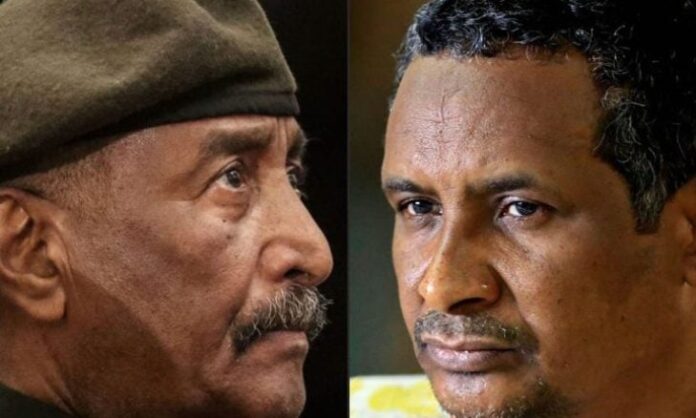Khartoum: Sudanese political forces on Monday rejected the announcement by the “Ta’sis” (Founding) Alliance of a parallel government to the one currently ruling from Port Sudan, warning that the move could lead to the division of the country.
On Saturday, the Ta’sis Alliance announced the formation of a government in areas controlled by the Rapid Support Forces (RSF), consisting of a presidential council of 15 members led by the RSF commander, and named Mohamed Hassan al-Ta’ayshi as Prime Minister.
Kamal Karrar, a member of the Central Committee of the Sudanese Communist Party, told “Sudan Tribune” that his party “rejects any government, whether it is a civilian front for the RSF militia or the army led by Kamil Idris in Port Sudan.”
Karrar considered the timing of the government’s announcement—coming before the convening of the Quartet meeting in Washington—as aimed at entering any upcoming political settlement as a political alliance, rather than as a mere armed militia.
The United States is set to host meetings in the coming days involving Egypt, Saudi Arabia, and the UAE, with expectations of Qatar and Britain joining as well. The aim is to explore solutions to end the conflict in Sudan.
Sharif Mohamed Othman, political secretary of the Sudanese Congress Party, said the threats of social, political, and geographic division since the war’s outbreak had been clear to all.
Sharif told “Sudan Tribune” that “those who ignited the war have deliberately deepened these threats by rejecting calls to end the conflict, preventing some citizens from obtaining identity and travel documents, and seeking false legitimacy that does not contribute to a solution, but rather deepens the crisis.”
He added, “These actions have, in turn, led to a race from the other side to seek opposing legitimacy, fueled by internal and external agendas that incite and drive the country towards division in a systematic manner.”
Adel Khalafallah, spokesperson for the Arab Socialist Baath Party – Original, announced his group’s rejection of prolonging the war through “political escalation in response to the escalation by the de facto authority.”
Khalafallah said, “Regardless of the justifications and pretexts accompanying the announcement of the parallel government, it falls within the context of war camps exchanging roles to prolong the conflict—through political escalation at one time and military escalation at another—in protection of their narrow interests.”
Babiker Faisal, head of the executive office of the Federal Gathering, warned that the continuation of the war represented an existential threat to Sudan and could lead to the division and fragmentation of the country’s unity.
The “Forces of Freedom and Change – Democratic Bloc” coalition considered the RSF’s announcement of forming what it called a “Founding Government” to be legally, politically, and morally void, describing it as “a failed attempt to promote a project that does not reflect the will of the Sudanese people.”
The coalition added in a statement that the alleged “parallel government” was nothing but a flimsy, artificial digital interface for a group of power-seekers, war criminals, and opportunists beholden to foreign agendas.
The Ta’sis (Founding) Alliance consists of military, political, and civil groups, most notably the RSF and the Sudan People’s Liberation Movement – North. Its foundational charter was signed last February in Nairobi, Kenya.
Founded on February 22, the alliance includes the RSF, armed movements, political parties, and civil forces—foremost among them the “Sudan People’s Liberation Movement” led by Abdel Aziz al-Hilu, whose forces control areas in South Kordofan and the Nuba Mountains, as well as the “Revolutionary Front,” which includes several armed movements in Darfur, along with factions from the National Umma Party and the Democratic Unionist Party, and a number of independent figures.
The RSF controls most of the Darfur region in western Sudan and parts of the Kordofan region.
Since mid-April 2023, the Sudanese army and the RSF have been engaged in a war that has resulted in tens of thousands of deaths and millions of internally and externally displaced people.
(DPA)


